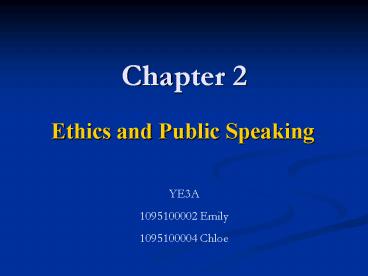Ethics and Public Speaking - PowerPoint PPT Presentation
1 / 25
Title:
Ethics and Public Speaking
Description:
To restate or summarize an author's ideas in one's own words. Plagiarism and the Internet ... From all these ways we mentioned above, your speech will offer a ... – PowerPoint PPT presentation
Number of Views:814
Avg rating:5.0/5.0
Title: Ethics and Public Speaking
1
Chapter 2
- Ethics and Public Speaking
YE3A 1095100002 Emily 1095100004 Chloe
2
Ethics
- The branch of philosophy that deals with issues
of right and wrong in human affairs.
3
Ethical decisions
- Sound ethical decisions involve weighing a
potential course of action against a set of
ethical standards or guidelines.
4
Guidelines for ethical speaking
- 1. Make sure your goals are ethically sound
- 2. Be fully prepared for each speech
- 3. Be honest in what you say
- 4. Avoid name-calling and others forms of
- abusive language
- 5. Put ethical principles into practice
5
Guideline 1Make sure your goals are ethically
sound
- What do the speakers hope to accomplish?
6
Guideline 2Be fully prepared for each speech
- You have an obligation to yourself and your
listenersto prepare fully every time you stand
in front of an audience.
7
Guideline 3Be honest in what you say
- Make sure the words you say can be trusted and
people will be truthful.
8
Name-calling
- The use of language to defame, demean, or degrade
individual or groups.
9
Guideline 4Avoid name-calling and abusive
languages
- Words are powerful weapons. Our identities,
- Who we are, how others see us, are affected by
the names we are called and the words with which
we are labeled.
10
Guideline 5Put ethical principles into practice
- Being ethical means behaving ethically
- all the time
11
Plagiarism
- Presenting another persons language or ideas as
ones own
12
Types of plagiarism
- 1. Global plagiarism
- 2. Patchwork plagiarism
- 3. Incremental plagiarism
- 4. Plagiarism and the internet
13
Global Plagiarism
- Stealing a speech entirely from a single source
and passing it off as ones own.
14
Patchwork Plagiarism
- Stealing ideas or language from two or three
sources and passing them off as ones own.
15
Incremental Plagiarism
- Failing to give credit for particular parts of a
speech that are borrowed from other people.
16
Incremental Plagiarism
- ?Quotations
- A phrase or short piece of writing taken from
a longer - work of literature, poetry, etc. or what
someone else has - said.
- ?Paraphrases
- To restate or summarize an authors ideas in
ones own words.
17
Plagiarism and the Internet
- The internet now covers to much information that
we can get easily. In other words, it is easy for
us to copy the information we want from the web.
18
Guidelines for ethical listening
- 1. Be courteous and Attentive
- 2. Avoid prejudging the speaker
- 3. Maintain the free and open expression of ideas
19
Guideline 1Be courteous and attentive
- As a listener, you should be respectful and try
to pay attention to the speaker.
20
Guideline 2Avoid prejudging the speaker
- Listeners should strive to understand and respect
speakers before evaluating and responding to
their message.
21
Guideline 3Maintain the free and open expression
of ideas
- Public speakers have an almost unlimited right
for expression. But it is important to keep in
mind that ensure a speakers freedom to express
the ideas doesnt imply agreement with those
ideas.
22
Summary
- ?Guidelines for ethical speaking
- 1. Make sure your goals are ethically sound
- 2. Be fully prepared for each speech
- 3. Be honest in what you say
- 4. Avoid name-calling and others forms of
abusive language - 5. Put ethical principles into practice
- ?Types of plagiarism
- 1. Global plagiarism
- 2. Patchwork plagiarism
- 3. Incremental plagiarism
- 4. Plagiarism and the internet
23
- ?Guidelines for ethical listening
- 1. Be courteous and Attentive
- 2. Avoid prejudging the speaker
- 3. Maintain the free and open expression of
ideas
24
Conclusion
From all these ways we mentioned above, your
speech will offer a good testing ground for
questions of ethical responsibility.
25
References
- THE ART of PUBLIC SPEAKING
- ninth edition by Stephen E. Lucas
- Published by McGraw. Hill International edition































